The Charles Dickens Page
Charles Dickens and Edgar Allan Poe in Philadelphia
A Literary Meeting
By Herb Moskovitz
Reprinted with permission of the author
Published on this site May 25, 2013
Young Edgar Allan Poe wanted to be the first American writer to support himself solely by his writings. Washington Irving was a diplomat, Hawthorne was a surveyor, Thoreau made pencils. Poe was an editor, a literary critic, a poet and an author of short stories. He was always writing. But he didn't get paid very well.
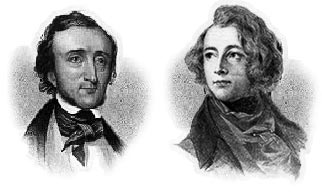
Over in England, young Charles Dickens was becoming an author who lived on his writings. His breakthrough came with his first novel, The Pickwick Papers, which was published in 1836 through 1837. Dickens's novel is extremely humorous. Poe was writing tales of the grotesque and arabesque.
Listen to this..."I remember days when I was afraid of being mad; when I used to start from my sleep, and fall upon my knees, and pray to be spared from the curse of my race; when I rushed from the sight of merriment or happiness, to hide myself in some lonely place, and spend the weary hours in watching the progress of the fever that was to consume my brain. I knew that madness was mixed up with my very blood, and the marrow of my bones! that one generation had passed away without the pestilence appearing among them, and that I was the first in whom it would revive. I knew it must be so: that so it always had been, and so it ever would be: and when I cowered in some obscure corner of a crowded room, and saw men whisper, and point, and turn their eyes towards me, I knew they were telling each other of the doomed madman; and I slunk away again to mope in solitude."
The narrator goes on to literally scare his wife to death, attempts to hide his madness from the authorities and is finally incarcerated. Anybody know which story this is? Author?
It's from chapter 11 of The Pickwick Papers.
Pickwick Papers is moving along with increasingly funny incidents, but in the middle of the story, Dickens inserts nine dark tales. The second of these, "The Madman's Manuscript" is indeed told by a madman. Reading this tale, one can't help wonder if Poe was influenced by it.
He was. Poe reviewed The Pickwick Papers for the Southern Literary Messenger and he just can't stop praising "The Madman's Manuscript."
The narrator of the "Madman's Manuscript" as well as the narrator of "Ligeia", (published September 1838), are both unable to remember anything about their murdered wives other than that they were beautiful. The narrator of "The Madman's Manuscript" tells us he is mad. The narrators of "The Black Cat" and "The Tell Tale Heart" are both mad, though they try to hide their insanity from the authorities. All three narrators are murderers who tell us of their crimes, try to avoid the authorities and are found out.
Other tales in Pickwick Papers are equally dark. Edgar Johnson points out in his biography of Dickens that "Save for the healing sunlight of laughter, the bitter vapors hidden within this region of his soul might well have spread and made him a fellow wanderer with Edgar Allan Poe through regions of haunted and phantasmal dread."
After failing to provide for his young wife Virginia and his mother-in-law, Maria Clemm in Baltimore, Richmond and New York, Poe and his family moved to Philadelphia in the summer of 1838. Conditions were so bad that they were living on a diet of bread and molasses.
Philadelphia in the 1840s was a far different city from the genteel greene towne that William Penn had founded. It was still the most enlightened, genteel and humane of American cities but there was an underside filled with horrors. Southwark – the area we now call Queen Village was very much like the Five Points Dickens described in New York.
This milieu influenced Philadelphia authors such as Charles Brockden Brown, Robert Montgomery Bird and George Lippard to write stories filled with horror and terror.
Lippard's book about a house of horrors in Southwark, The Quaker City or The Monks of Monk Hall was the best selling novel in America for many years. These Philadelphia authors had a strong influence on Poe. One story by Brockden Brown, published in 1799 is such a strong influence on "The Pit and the Pendulum" that it borders on plagiarism. Lippard became a lifelong friend and supported Poe – both financially and professionally.
It was about this time that a black cat joined the household. Poe wrote about her in an article...
"The writer of this article is the owner of one of the most remarkable black cats in the world – and this is saying much; for it will be remembered that black cats are all of them witches. The one in question has not a white hair about her, and is of a demure and sanctified demeanor. That portion of the kitchen which she most frequents is accessible only by a door, which closes with what is termed a thumb-latch; these latches are rude in construction, and some force and dexterity are always requisite to force them down. But puss is in the daily habit of opening the door."
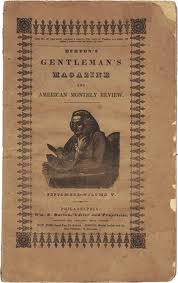 In May of 1839 Poe finally had a job; he became editor of a literary magazine called Burton's Gentleman's Magazine. While there he published a number of successful stories including, "The Fall of the House of Usher."
In May of 1839 Poe finally had a job; he became editor of a literary magazine called Burton's Gentleman's Magazine. While there he published a number of successful stories including, "The Fall of the House of Usher."
In the summer of 1839, an Ourang Outang was exhibited at the Masonic Hall, and no doubt this animal inspired the ape in "The Murders in the Rue Morgue."
In early December, Lea and Blanchard, who were the leading publishers in Philadelphia, and who also had dealings with Dickens, published Tales of the Grotesque and Arabesque. This collection of twenty-five stories included "Morella", "William Wilson", "The Fall of the House of Usher", "Ligeia" and "Berenice." It received favorable reviews but it did not sell well.
Poe left Burtons and tried to start his own magazine, but luck was against him and he soon was working for Graham's Magazine (in the Public Ledger Building. Across Chestnut Street is Lippard's office).
As editor, Poe eventually increased the circulation of the magazine from 6,000 in January 1841 when he started, to 40,000 in May 1842, making it the most popular literary magazine in America at the time.
In April of 1841 Graham's Magazine published "The Murders in the Rue Morgue", which is considered to be the first detective story (as well as the first locked room mystery).
A bit later in 1841 Poe was reading Barnaby Rudge by Charles Dickens.
As was typical of Dickens's works, the novel was published in installments. Barnaby Rudge has a double murder mystery as a central plot point and the editor of the Saturday Evening Post challenged Poe as the creator of the detective story, as well as an expert cryptogram solver, to solve the murder mystery when less than a fifth of the book had been published. Poe's solution, which was basically correct, was published in the Post on May 1, 1841. Dickens was shown Poe's solution before he had finished writing the end of the novel and said, "He must be possessed of the devil."
Dickens (whose own name means "devil") did have a devilish character in Barnaby Rudge. Barnaby is a simpleton who owns a pet raven named Grip. Dickens himself got a raven to study, so he would portray the fictional raven properly. Dickens also named the real raven Grip and the phrases the fictional Grip said were based on what the real Grip said. One of his favorite expressions was, "I'm a devil, I'm a devil." We'll come back to Grip later.
By 1842, thirty-year old Charles Dickens was one of the most famous men in the English-speaking world. His novels, The Pickwick Papers, Oliver Twist, Nicholas Nickleby and The Old Curiosity Shop had been incredible successes. Poe wrote that Dickens was "the greatest British novelist."
Dickens decided to visit America, partly to see the democratic society that seemed to be a beacon to the world, partly to argue for fair copyright laws, partly to gather material that may be used in either a little book or a series of essays and largely to meet his American readers. Washington Irving had written to him that (and I quote Dickens), "If I went, it would be such a triumph from one end of the States to the other, as was never known in any Nation."
Before the year was out, he had written his travel book, American Notes, and he had also used his new knowledge and opinions of us when he sent two of his characters in his next novel, Martin Chuzzlewit, to have some adventures here.
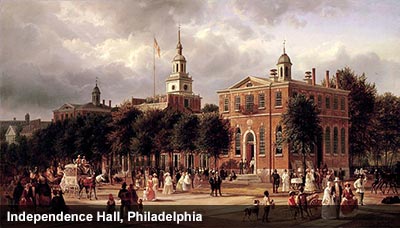
Dickens and his wife Catherine visited Philadelphia, March fifth through the ninth 1842. He devoted a chapter to Philadelphia in American Notes.
Philadelphia was one of the first planned cities in the world, and the grid system that William Penn and Thomas Holme devised in the seventeenth century was a model for many other cities. Still, Dickens found it had faults:
"It is a handsome city, but distractingly regular. After walking about it for an hour or two, I felt that I would have given the world for a crooked street. The collar of my coat appeared to stiffen, and the brim of my hat to expand, beneath its quakerly influence."
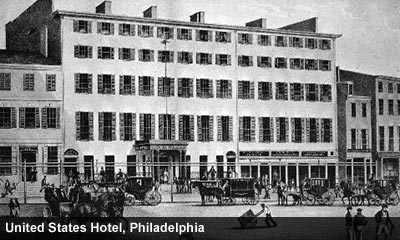
Dickens stayed at the United States Hotel on Chestnut Street between 4th and 5th Streets.
Catherine had become ill while they were in New York and this delayed Dickens's arrival in Philadelphia by a week. The hotel proprietor charged Dickens for the week for which he had reserved a room, but didn't use. Dickens had no problem with that, but the landlord also charged Dickens nine dollars a day for the food that he and Catherine had not eaten there. The proprietor told Dickens it was customary to do so.
Dickens had another unpleasant experience at the United States Hotel. A prominent Philadelphian had asked Dickens if a few of his personal friends could call on him at the hotel. Dickens agreed and was horrified to read in the newspapers on March 8th that "Charles Dickens would be gratified to shake hands with his American friends, by holding a levee that morning at the hotel between the hours of 10 and 11:30." Dickens was forced to agree to do this, because if he failed to show there could possibly be a riot, and so for two hours he had to allow his arm to "almost be shaken off."
The United States Hotel faced the Second Bank of the United States, a magnificent Greek revival building by William Strickland.
"Looking out of my chamber window, before going to bed, I saw, on the opposite side of the way, a handsome building of white marble, which had a mournful, ghost-like aspect, dreary to behold. ... It was the tomb of many fortunes; the Great Catacomb of investment; the memorable United States Bank."
Not far from the Second Bank of the United States, in "the historic mile" is the Pennsylvania Hospital which Dickens visited.
"There are various public institutions. Among them a most excellent Hospital - a quaker establishment, but not sectarian in the great benefits it confers; ...there is a picture by West, which is exhibited for the benefit of the funds of the institution. The subject is, our Saviour healing the sick, and it is, perhaps, as favourable a specimen of the master as can be seen anywhere. Whether this be high or low praise, depends upon the reader's taste."
In Fairmount Park, just behind the Art Museum, one can see the wonderful Waterworks, which Dickens had admired, recently restored to their original splendor.
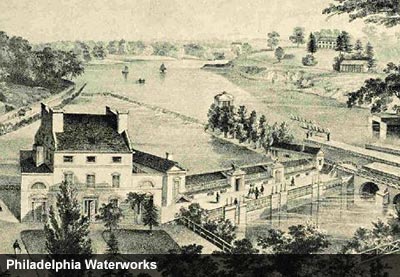
"Philadelphia is most bountifully provided with fresh water, which is showered and jerked about, and turned on, and poured off, everywhere. The Waterworks, which are on a height near the city, are no less ornamental than useful, being tastefully laid out as a public garden, and kept in the best and neatest order. The river is dammed at this point, and forced by its own power into certain high tanks or reservoirs, whence the whole city, to the top stories of the houses, is supplied at a very trifling expense."
A few blocks north of the Waterworks is Girard College.
"Near the city, is a most splendid unfinished marble structure for the Girard College, founded by a deceased gentleman of that name and of enormous wealth, which, if completed according to the original design, will be perhaps the richest edifice of modern times. But the bequest is involved in legal disputes, and pending them the work has stopped; so that like many other great undertakings in America, even this is rather going to be done one of these days, than doing now."
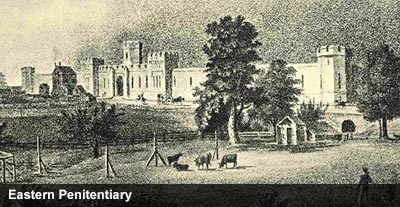
In 1842, Eastern State Penitentiary was one of the wonders of Philadelphia. Built on a prominent hill it could be seen from the center of the city, where it could instill fear in the hearts of anyone planning a criminal act.
"In the outskirts, stands a great prison, called the Eastern Penitentiary: conducted on a plan peculiar to the state of Pennsylvania. The system here, is rigid, strict, and hopeless solitary confinement. I believe it, in its effects, to be cruel and wrong.
In its intention, I am well convinced that it is kind, humane, and meant for reformation; but I am persuaded that those who devised this system of Prison Discipline, and those benevolent gentlemen who carry it into execution, do not know what it is that they are doing."
Dickens goes on for the rest of the American Notes chapter about Philadelphia with a vivid diatribe against the prison and solitary confinement.
Before Dickens arrived in Philadelphia he received a note from the relatively unknown Edgar Allan Poe requesting an audience. We don't have Poe's letter to Dickens, but we do have Dickens's response:
"My Dear Sir – I shall be very glad to see you whenever you will do me the favor to call. I think I am more likely to be in the way between half past eleven and twelve than at any other time. I have glanced over the books you have been so kind as to send me, and more particularly at the papers to which you called my attention. I have the greater pleasure in expressing my desire to see you on this account."
Did Dickens remember that Poe had solved the mystery of Barnaby Rudge? Poe had sent Dickens a copy of his Tales of the Grotesque and Arabesque and his two very favorable reviews of Barnaby Rudge. Dickens granted him an interview on Monday, March 6th - most likely they met at the hotel. Poe wrote to James Russell Lowell and said that he had met with Dickens twice.
David Wallechinsky & Irving Wallace in The People's Almanac report that "Poe wore a somber suit and mended gloves. On the first visit, Dickens received Poe wearing a green necktie in a diamond clasp under his shirt and a velvet vest with a gold chain. On the second visit, Dickens wore a dressing gown with violet facings."
They discussed the state of American poetry, Poe read a poem by Emerson To the Humble Bee, and Dickens promised to try to find a British publisher for Poe's Tales of the Grotesque and Arabesque and although he did try, he was unsuccessful. Dickens wrote to Poe around nine months later, "I have mentioned it to publishers with whom I have influence, but they have, one and all, declined the venture... . Do not for a moment suppose that I have ever thought of you but with a pleasant recollection; and that I am not at all times prepared to forward your views in this country."
This failure on Dickens's part may have led to resentment on Poe's part, as he may not have thought that Dickens had really tried.
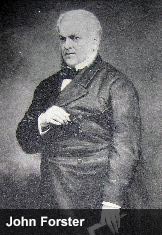 Poe definitely did get angry at Dickens about two years later. An article on American Poetry appeared in the Foreign Quarterly Review, which was edited by Dickens's best friend, John Forster.
Poe definitely did get angry at Dickens about two years later. An article on American Poetry appeared in the Foreign Quarterly Review, which was edited by Dickens's best friend, John Forster.
The article praised Longfellow as the first of American Poets, and also praised Emerson, William Cullen Bryant and Fitz-Greene Halleck. The article talked about how imitative American poetry was and said "Poe was a capital artist after the manner of Tennyson." Poe was furious and thought that Dickens had written the article because many of the points made in the article were similar to the conversation he had had with Dickens in Philadelphia. He wrote to Lowell accusing Dickens of being the author.
Lowell felt that it was not Dickens, but Forster who wrote it and eventually a letter written by Longfellow to Forster, thanking him for the praise, came to light and proved Dickens innocent of the accusations.
On the other hand, Dickens's view of Poe remained steadfast. He wrote to Forster that he "was really indebted for a good broad grin to" Poe, "literary critic of Philadelphia and sole proprietor of the English language in its grammatical and idiomatic purity; to" Poe, "with the shiny straight hair and turned-down shirt collar, who...told me...that I had awakened a new era in his mind."
The years in Philadelphia were the most productive of Poe's life. Thirty-one of his short stories were published in popular magazines while he was living here and many of them are the best he wrote. Others were taking notice of his work. In August 1843 the Walnut Street Theater in Philadelphia presented a dramatization of "The Gold Bug."
"The Black Cat" was almost certainly written while Poe lived in what is now the Poe House on 7th Street with a cat named Catterina.
One can still go down into the basement and see the stairs, window and false chimney in exactly the same locations as described in the story.
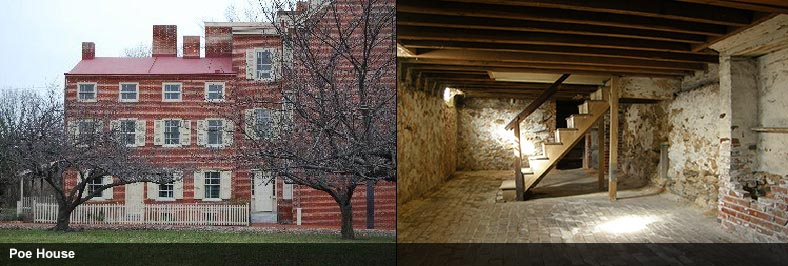
Despite these successes, Poe would not become a household name until the publication of The Raven in 1845 when he was living in New York.
Poe scholars almost universally agree that Dickens's Grip was a major inspiration for Poe. When reviewing Barnaby Rudge for Graham's Magazine Poe said, "the raven...intensely amusing as it is, might have been made, more than we now see it, a portion of the conception of the fantastic Barnaby. Its croakings might have been prophetically heard in the course of the drama."
There is another clue that Poe was influenced by Dickens. At the end of chapter five of Barnaby Rudge, there is a noise and Varden, thinking it was Grip, says, (Varden) "What was that – him tapping at the door?" The response is, (Barnaby’s mother) "'Tis someone knocking softly at the shutter."
James Russell Lowell saw the connection when he wrote in a poem about poets:
"There comes Poe with his raven, like Barnaby Rudge Three-fifths of him genius and two-fifths sheer fudge."
There are many other instances where scholars have found Dickens influencing Poe. Professor Michael Slater, arguably the world's leading Dickensian scholar, says that the scene in chapter 18 of Barnaby Rudge where Barnaby Rudge Senior's situation has him alone in the streets at night but trying to be near human activity might well have helped inspire Poe's story, "The Man of the Crowd."
A short story by Dickens in Master Humphrey's Clock is pretty much the same story as "The Tell-Tale Heart", and "The Black Cat." "A Confession Found in a Prison in the Time of Charles the Second" has the narrator telling us of his being unsettled by the gaze of his nephew, his killing the child and burying the body in his garden and then inviting some of the soldiers looking for the child to sit with him, their chairs unknowingly over the grave. And while they are there similar events lead to the discovery of the body. Poe wrote a very positive review of this story and said of it, "a paper of remarkable Power, truly original in conception, and worked out with great ability."
Poe told Frederick W. Thomas that the ultimate inspiration for "The Bells" was Dickens's Christmas story, The Chimes. Scholars have demonstrated how Dickens's motifs and repetitions are similar to parts of Poe's poem, as well as similar rhetorical and repetitive structure, even some grotesque elements are seen in stanzas 3 and 4.
Nineteen years after Poe's death in 1849 at age 40, Dickens visited Poe's impoverished mother-in-law, Mrs Maria Clemm, when he returned to America in 1868 and gave her a substantial amount of money at the end of his visit.
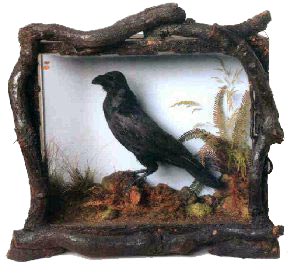 When Dickens died, his family sold many of his possessions. One item that was sold was the pet raven Grip, who when he died, Dickens had stuffed and mounted and put on display in the entrance hall in his home in England.
When Dickens died, his family sold many of his possessions. One item that was sold was the pet raven Grip, who when he died, Dickens had stuffed and mounted and put on display in the entrance hall in his home in England.
Colonel Richard Gimbel, of Gimbels Department Store fame, eventually purchased Grip – for his Poe collection. Colonel Gimbel knew the connection between Dickens and Poe.
Grip is now on permanent display in the Philadelphia Free Library's Rare Book Department. You should pay him a visit someday. You will like the place. It's where you can read and ponder over many a quaint and curious volume of forgotten lore.
Sources:
American Notes – Charles Dickens
Edgar Allan Poe – His Life and Legacy, Jeffrey Myers
The Poe Log, Dwight Thomas and David K. Jackson
Edgar Allan Poe – A to Z, Dawn B. Sova
The Letters of Charles Dickens – Pilgrim Edition – (as compiled by Pat Vinci )
Christopher Morley's Philadelphia, Christopher Morley
A Fable for Critics, page 59, James Russell Lowell
Edgar A. Poe: Mournful and Never-ending Remembrance, Ken Silverman
Charles Dickens, His Tragedy and Triumph, Edgar Johnson
The Edgar Allan Poe Review, Vol X, Number 2, "Revisiting the Poe-Dickens Relationship", Fernando Galvأ،n.
Jim DeWalt - Notes for the showcases for Quoth the Raven, A 200 Year Remembrance of the Life and Legacy of Edgar Allan Poe, October 2008, Rare Book Department, Philadelphia Free Library.
Dr. Neil K. Fitzgerald – Notes for the showcases for Philadelphia Gothic, October 2008, Library Company of Philadelphia.
Mark Dawidziak - Paper: "Dickens and Poe: The Perfect Manic-Depressive"
Conversations with Helen McKenna-Uff and Steve Medeiros, National Park Rangers at the Edgar Allan Poe National Historic Site.
Conversations with Michael Slater.
Conversations with Michael Patrick Hearn
Herb Moskovitz is an active member of The Dickens Fellowship in both New York and Philadelphia.
